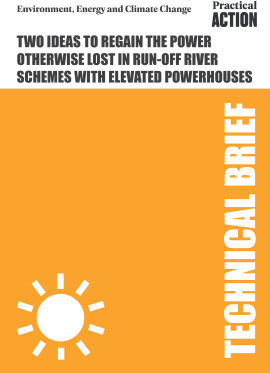
Poor People's Energy Outlook 2019
PPEO 2019 is the culmination of five years’ research, exploring what it takes to realise the kinds of energy services that enable people living in energy poverty to thrive. The report compiles and updates key messages and recommendations on energy access planning (PPEO 2016), financing (PPEO 2017) and delivering at scale, while also leaving no one behind (PPEO 2018). It draws on primary research from community consultations in Bangladesh, Kenya and Togo, as well as analysis of energy access programmes across Latin America, South Asia and sub-Saharan Africa; considering how to ramp up energy access from small-scale interventions to national and global levels, to ensure that the transformational power of energy is universally enjoyed.
This is because, with just a decade to go until the deadline for the 2030 Global Goals, universal energy access remains elusive. Scaling-up access will require a huge increase and re-balance of investment, innovative business models, changes in policy frameworks and institutional capacity, increased awareness, and improved technical solutions. PPEO 2019 explores progress achieved across these elements to date and considers what remains to be done, to ensure that we truly leave no one behind in our pursuit of SDG7.
Series: Practical Action
Published: 2019
Pages: 72
eBook: 9781780447834
This is because, with just a decade to go until the deadline for the 2030 Global Goals, universal energy access remains elusive. Scaling-up access will require a huge increase and re-balance of investment, innovative business models, changes in policy frameworks and institutional capacity, increased awareness, and improved technical solutions. PPEO 2019 explores progress achieved across these elements to date and considers what remains to be done, to ensure that we truly leave no one behind in our pursuit of SDG7.
| 1. Introduction | |||
|---|---|---|---|
| A framework for action in a changing world | |||
| Our inclusive approach | |||
| Methodologies for a bottom-up perspective | |||
| 2. The road to 2030 | |||
| Energy access: overall trends | |||
| Clean cooking | |||
| Electricity access | |||
| Achieving universal access by 2030: what needs to change | |||
| 3. Clean cookstoves and fuels | |||
| Bottom-up planning for clean cooking solutions | |||
| Financing the transition to improved cooking solutions | |||
| Delivering clean cooking solutions at scale and inclusively | |||
| Recommendations | |||
| 4. Electrification | |||
| Bottom-up planning for electrification: meeting broad energy service needs | |||
| Financing the stretch to electricity access for all | |||
| Delivering electricity access at scale and inclusively | |||
| Recommendations | |||
| 5.People-focused delivery | |||
| Reaching the unserved billions | |||
| Unlocking the necessary funding | |||
| Planning and policy that meets people’s needs | |||
| Reaching the ‘last mile’ through better planning, finance, and delivery | |||
| 6. Conclusions and recommendations | |||
| Notes | |||
| References |
Practical Action
Practical Action is an innovative international development organisation putting ingenious ideas to work so people in poverty can change their world.
Kit “Energy, Environment and Sustainability”: An Educational Strategy for a Sustainable Future. A Case Study for Guinea-Bissau
Oliveira, Joana
Neves, Luísa
Lanceros-Mendez, Senentxu
Education Sciences, Vol. 11 (2021), Iss. 12 P.787
https://doi.org/10.3390/educsci11120787 [Citations: 2]“Sustainable energy for all” how this undermines human development: an operational and statistical analysis
Laghari, Mushtaque Ahmed
Akhter, Muhammad Javeed
Rehman, Hafeez ur
Abbas, Qaisar
(2025)
https://doi.org/10.1007/s10668-025-06177-5 [Citations: 2]Addressing Challenges in Delivering Sustainable Rural Water Provision Using Solar Water Pumping in Malawi: A Stakeholder Analysis
Phiri, Esther
Rowley, Paul N.
Blanchard, Richard E.
Energies, Vol. 16 (2023), Iss. 23 P.7758
https://doi.org/10.3390/en16237758 [Citations: 2]A framework of basic human energy needs for decent quality of life at household level: policy implications for enhancing energy justice and meeting SDG7
Shyu, Chian-Woei
(2024) P.1
https://doi.org/10.1080/17516234.2024.2446020 [Citations: 1]Does Revisiting Multidimensional Energy Poverty Measurement Index Address Universal Energy Access?
Bajpayee, Priyandu M
Mohanty, Pratap C.
Energy RESEARCH LETTERS, Vol. 6 (2025), Iss. Early View
https://doi.org/10.46557/001c.127523 [Citations: 0]Mitigation and Adaptation of Urban Overheating
The impact of heat adaptation on low-income population
Boemi, Sofia Natalia
2024
https://doi.org/10.1016/B978-0-443-13502-6.00008-7 [Citations: 1]





